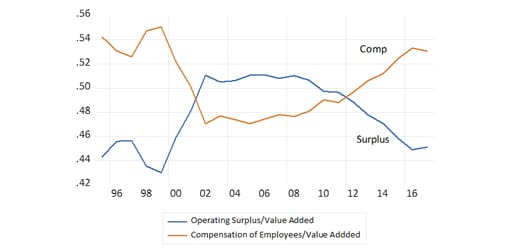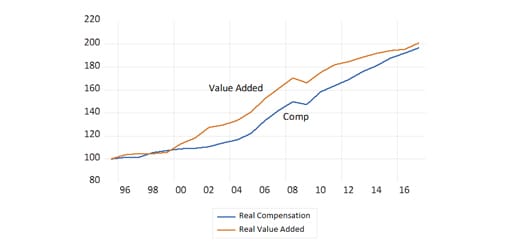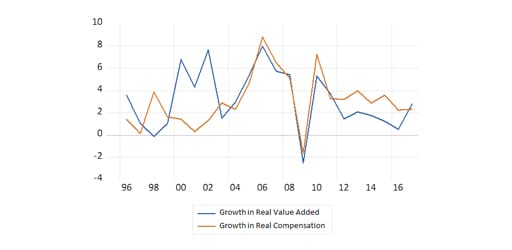The latest labour force survey of about 30,000 households released by Stats SA confirmed the baleful state of the labour market, which is the growing mismatch between supply and demand for workers. In the third quarter, the supply of potential workers increased by 153,000, or 0.4%. This was much faster than the demand for them, which increased by 92,000 (to 16.4 million). The number defined as unemployed (those not working but actively looking for work), increased by 127,000 to 6.2 million, pushing the unemployment rate up to 27.5% of the potential workforce.
But not all the news on the employment front was bad – depending on your perspective. While the formal sector continues to shed jobs, the informal sector is adding them at a rapid rate. In the third quarter, informal employment outside of agriculture rose by 188,000, and by 327,000 (12.2%) during the past year to over 3 million workers employed informally, which is over 18% of all employed.
The decline in formal and the increase in informal employment is not a coincidence. Formal employment has been subject to a rising tide of intervention by government and trade unions (with more to come soon, in the form of a national minimum wage). These have provided those in jobs with consistently improved wages and other valuable employment benefits, as well as security (to a degree) against dismissal and compensation for retrenchment.
The informal sector’s employers and workers largely escape these constraints on the freedom to offer and supply employment opportunities. If formal employment (decent jobs, as they are described) is unattainable, the choice may only be informal employment or not working at all.
While formal employment outside of the public sector has stagnated, the share of employment costs in total value added by private business has not fallen. The bill for employment benefits has gone up in real terms, as have employment benefits for those in work, even as the numbers employed have gone down (see figures below).
Non-financial corporations’ share of value added: Operating surplus and compensation of employees

Source: SA Reserve Bank and Investec Wealth & Investment
Real value added by non-financial corporations (1995=100) using the household consumption deflator

Source: SA Reserve Bank and Investec Wealth & Investment
Non-financial corporations’ growth in real value added and real compensation (using the household consumption deflator)

Source: SA Reserve Bank and Investec Wealth & Investment
If the wage bill in any sector of the economy goes up faster than the decline in union membership (as it has been doing), the pool of income upon which to draw union dues deepens. Strikes that increase benefits at the expense of employment are therefore not irrational from the perspective of union leaders if wages increase at a faster rate than employment declines.
The "Decent Jobs Summit"
The jobs summit would have been better described as the “Decent Jobs Summit”, for which the heralded Landmark Framework Agreement is but a wish list of everything that can be imagined to promote the demand for labour. It’s a plan, however, that gives no consideration to the impact of the rising cost of hiring labour, and the more onerous conditions imposed on this hiring. This may have had something to do with the disappointing volume of employment provided.
Most of us would like to see decent jobs for all who are able and willing to work. We also hope that economic growth can make it possible – as it has largely in the developed world. But the truth is that too few South Africans have the skills, the qualifications or experience to allow them to be employed on decent terms by cost-conscious employers.
The soon to be imposed National Minimum Wage (NMW) of R3 500 per month will make it more difficult to find employment outside of the informal sector because these minimums are well above what many in employment currently earn.
For all of the many (including economists who should know better) who wish wages higher and poverty away, it has been convenient to ignore the findings of one comprehensive and highly relevant study. The study is by Haroon Bhorat and colleagues on the impact of higher minimums etc. on employment in SA agriculture, introduced after 2003.
The impact on employment (down 20%) and improved wage benefits for those still employed, were correctly described by the analysts as significant. There is every reason to conclude that the impact of the NMW on employment will be as significant and destructive for those who lose their jobs. And it will be helpful for those who retain their jobs on improved terms, as they will be even more carefully selected for the skills and strengths they bring to their tasks. The informal sector will have to come to the rescue of the larger numbers of unemployed workers while they wait impatiently for economic miracles.
About the author

Prof. Brian Kantor
Economist
Brian Kantor is a member of Investec's Global Investment Strategy Group. He was Head of Strategy at Investec Securities SA 2001-2008 and until recently, Head of Investment Strategy at Investec Wealth & Investment South Africa. Brian is Professor Emeritus of Economics at the University of Cape Town. He holds a B.Com and a B.A. (Hons), both from UCT.
Receive Focus insights straight to your inbox




